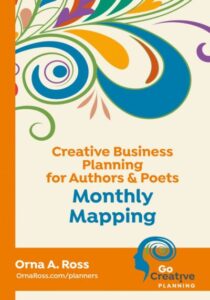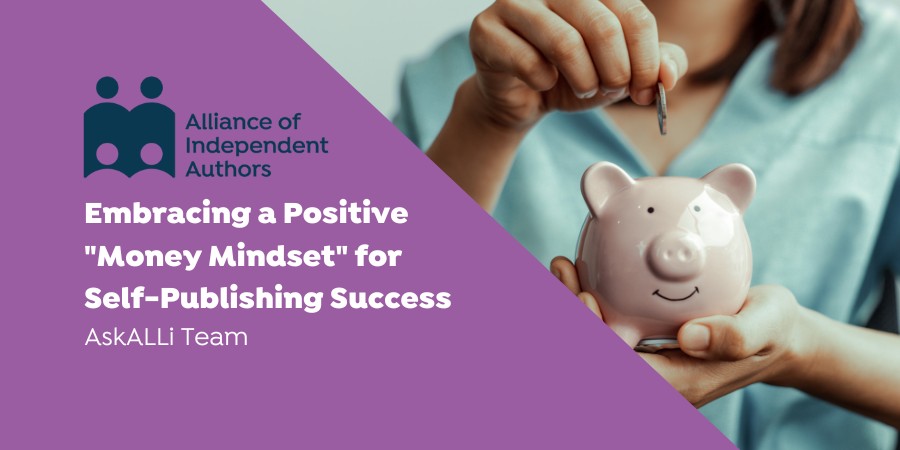
Photo by micheile dot com on Unsplash
The rise of self-publishing has not only brought about creative freedom for authors, but also a new personal responsibility for financial control over our own writing careers. This mindset shift can be daunting for those who have focused solely on the writing craft for many months or years. But here at the The Alliance of Independent authors, we believe that adopting a positive money mindset can turn what might feel like an overwhelming responsibility into an empowering opportunity.
If you’re finding it tricky to embrace the financial elements of indie publishing, read on for ALLi’s top tips for building a positive money mindset.
-
Embrace you are now a business
From the moment you upload your first book to a retailer website, you are in business. It might not feel like it, but the step that made you an author made you a publisher too. And that’s a good thing.
You are now taking personal responsibility for your own writing career. This means you are taking control of creating the best chances for your writing, which is an immense opportunity.
In financial terms, being a business owner means being in charge of all the money in relation to your writing, both the incomings and the outgoings. Money is the backbone of every business. If you embrace it, accept its management is an integral part of your indie author role, you’ll increase your chance of success.
-
Understand your own relationship with money
Some authors find it hard to accept that their creative endeavours are intertwined with money and sales. If that’s you, these mental obstacles might prevent you from actively managing the financial aspects of your writing career.
The first step is to identify what may be blocking you, Try this free-writing exercise. Free-writing is a creative practise where you write down thoughts quickly and continuously, without worrying about form, style, spelling or grammar. The aim is to see what flows naturally and perhaps access thoughts that have been hidden.
Set a timer and free-write for five minutes about how you respond when a person mentions money and art in the same sentence. What thoughts rush through your mind?
You may have thought about an enduring belief that wanting to earn from your art might devalue it or steal the joy from your much-loved hobby, or even that you don't deserve payment for your work, perhaps because it wasn’t your trained profession. You might have multiple images, beliefs and fears.
Now consider where those thoughts might have come from. What stories, images or historical figures have created these narratives in your mind?
We carry many beliefs that we’ve assimilated through what society tells us. They are often not based on facts.
For example, the “starving author” stereotype stems from the romantic era, where creating art was thought to be necessarily a painful process, and artists such has poets, authors and painters were expected to live in poverty. Since then society has moved on, yet for some, the story of the artist and author has not.
Since the digital revolution, authors are no longer reliant on gatekeepers or rich patrons to produce our work, and we can take control over all our financial transactions. Independent creators across all sorts of channels and platforms now make money directly from what they share with others. Why, then, shouldn't you?
-
Tell yourself a different story

(Image by Rawpixel via Unsplash.com)
Think of your favourite author. How does their work make you feel? Think of the enjoyment their books have brought to you and countless readers.
You wouldn’t begrudge your favourite author making the money they need to live comfortably, to support their family, or to be able to continue producing their books. And you would expect to pay to access their writing, right?
Well, it’s the same for you. Your reader expects that a financial transaction happens for them to receive your work. It's not greedy or selfish, and it doesn’t diminish the value of what you produce.
-
View money as a motivation for creativity
Here’s another angle. If you manage your author income actively, it is an energy that can drive your creative dreams.
Money can give you the space and time to spend more energy on your creativity. It can motivate your work ethic and bring increased activity to your craft.
Adding money to the creative equation might be the final push to take your writing seriously. You are no longer waiting for the muse to strike. Instead, your financial considerations can bring a new enthusiasm to write, produce and complete.
-
Practise gratitude for a positive money mindset

Photo by Gabrielle Henderson on Unsplash
When you think of receiving money for your creative work, think of gratitude. Express gratitude for what money allows you to do. It may be for your family, for yourself, or simply for giving you time to write.
Another way to be grateful for money is to focus on when it’s directed towards someone else. You might be just starting out with your publishing, but when there is an extra penny around, what can you do with it? You could donate it, buy a small gift for someone who has supported you and see the joy on their face, or perhaps share your success story and inspire someone to do something they’ve been putting off.
Sharing your success with others regularly in small ways will help you feel more positive.
-
Keep it simple
If you’re just starting out and are not sure how to focus your financial attention, think of the KISS principle. It stands for “Keep It Simple, Stupid”.
This may sound flip, but the KISS principle in the financial world can be freeing, particularly if financial management is stressful for you. It’s a reminder that, if nothing else, you should stick to one simple rule – spend less than you earn.
That’s it.
We strongly advise that you create a separate bank account for your publishing so you can see income and outgoings at a glance. Monitor what’s coming in and what’s going out and keep that clear goal at the forefront of your mind.
-
Avoid the pitfall of believing “it’s too hard”
Are you a little further on? Perhaps you are starting to make a profit and are discovering concepts, opportunities or decisions that are more complicated. There’s a popular belief that those with an artistic outlook don't make for good business owners. Don’t fall into that trap, or use it as an excuse to not take control.
Becoming a publisher does require learning new skills, but writers know how to research. We must research business and financial topics as they become relevant.
And you’re not alone. You may have friends or relatives working in business roles who you can ask for advice about decisions you’re not fully sure of. Don't be afraid to reach out.
You might need an accountant. Generally the national financial accounting institution for your nation will have a list of their certified members. You can also take recommendations from author friends and other ALLi members.
ALLi is always here to help too. In the coming months, we have a blog planned to decipher the key jargon for self-publishing financial management – so keep a lookout and bookmark! At the end of this post, you'll also find information and links to ALLi business planning resources, including the Quarterly Business Planner.
-

Photo by Gabrielle Henderson on Unsplash
Embrace business planning
Businesses thrive on strategy, and authors should too. Consider developing a comprehensive business plan that outlines your financial projections, your wider goals, key milestone dates, and even the details of activities, such as marketing, all in one place.
Your plan can be referred to whenever you are feeling unsure about your business decisions. A plan can motivate you and also reduce stress. You aren’t working in the dark.
This post on author planning from ALLi director Orna Ross is a good place to start. It recommends you begin with a roadmap with targets for four measures of success.
- Profits: your financial rewards. Expressed as money paid to yourself after all your publishing expenses are paid (personal bank deposit).
- Productivity: your output. Expressed as words completed (writing productivity) and books published (publishing productivity).
- Purpose: your influence and impact. Expressed as platform, reach and engagement with your mission and what is most meaningful for you as a writer (book sales, follower numbers and engagement).
- Personal satisfaction: your pleasure in your work. Expressed as a reading from one to 10 based on internal self-observation, one being misery and 10 creative bliss.
Knowing where you want to go and what success looks like in the short and long term (both financially and more widely) can also free you up to grab an unexpected opportunity that will help you achieve your objectives. This could be a great contact for sharing your marketing assets, a new platform that suits your target audience, or an event that would be perfect for you to attend. Knowing your goals can help you weigh up when unexpected opportunities are worthwhile.
-
Put on your different money mindset ‘hats’
You might think – wait, that isn’t why I got into writing! Don’t panic. Finance is not going to be your entire role. Just part of it.
It can help to divide your time into different roles – a “hat” or persona for each activity. You still hold the role of author; that will never go away. And when you put on your author hat, that’s when you can focus fully on your writing. Other times you will need your publisher hat – when your strategic, business and financial planning mind needs to take the lead. You may also want to divide out other roles, such as your marketing hat.
Dividing these roles can help you keep your creative writing time separate and sacred. If you are also easily distracted from your writing, these “hats” can help put a limit on the hours you devote to these other roles, and preserve your energy for creating.
What decisions might you tackle when wearing wearing your publisher hat? Here are examples.
- What will your business model be for book distribution – exclusive (with Amazon) or wide?
- Will you just be selling book(s) or other products to generate revenue?
- Will you pay yourself first before investing in other ways?
- How will you organise your banking and accounting information?
- Do you need an accountant?
- What do you believe will be your average monthly costs?
- What return on investment (ROI) are you aiming for?
- Have you set a budget for each book?
- Have you automated and streamlined your publishing activities where possible?
- Will you have a money day each month to focus on money management?
- What else do you need to consider for your business?
-
What if it all gets too big?
This may sound daft, but is there a part of you that wonders what would happen if you had a major success? Do you fear how you might manage the new financial questions such as where to reinvest in your writing business?
Forget that fear. Remember, other people have been here before. A range of professionals can save you time and creative energy in all your publishing and financial tasks. They can also caution you on future missteps and streamline your processes.
Professional help buys you time to move forward with your core tasks of writing and publishing. Or just putting your feet up for some creative rest and play. But first, get your business going (and KISS), and don't let anything hold you back.
In conclusion…
If you have chosen to go indie, you are in business, and that means thinking about money in a new way.
If you embrace this new responsibility and see the positives, you stand the best chance of success. You can manage your finances effectively, use money as a motivation for creativity and release more time to write. And if major success brings daunting financial decisions, you can reach out for help.
Start small. Pick a tactic (or two or three) that most resonates, note it on a Post-it and stick it to your desk. Glance at it every time you find yourself resisting the financial role of publishing. Use it as a mantra to keep building your positive money mindset and create a lasting career that leaves your stamp on the world.
Find out more
 You've probably heard of ALLi's top indie author guide book, Creative Self-Publishing, but did you know the new third edition comes with a newly updated business planning section? You can also get an accompanying series of planners that guide authors and poets with the day-to-day of writing and publishing. These practical planners support authors with:
You've probably heard of ALLi's top indie author guide book, Creative Self-Publishing, but did you know the new third edition comes with a newly updated business planning section? You can also get an accompanying series of planners that guide authors and poets with the day-to-day of writing and publishing. These practical planners support authors with:
- Optimising your time management and finances with tried-and-tested success tools
- Overcoming creative blocks with mind maps, charts for creative rest and play, and writing exercises
- Replacing overwhelm and procrastination with clarity and simplicity
- Setting effective success measures to aid your happiness
The Monthly Mapping Planner in particular aims to expand your impact, influence, and income as an indie author. Or take a look at the Quarterly Business Planner, which helps authors set ambitious but achievable targets over a three-month period, along with providing monthly work and profit planners, and lots more strategic support.
Both planners are available for purchase in multiple formats on our bookstore. Members enjoy free access to the ebook versions.




